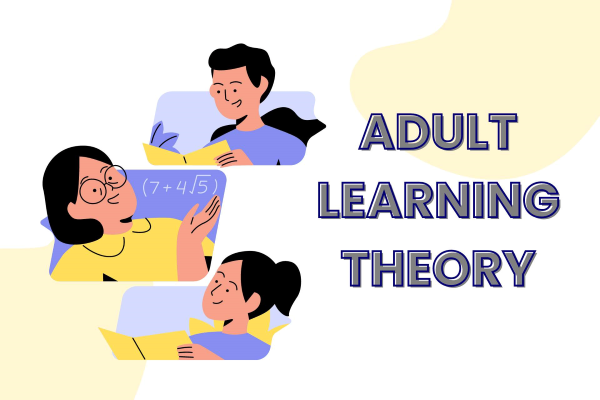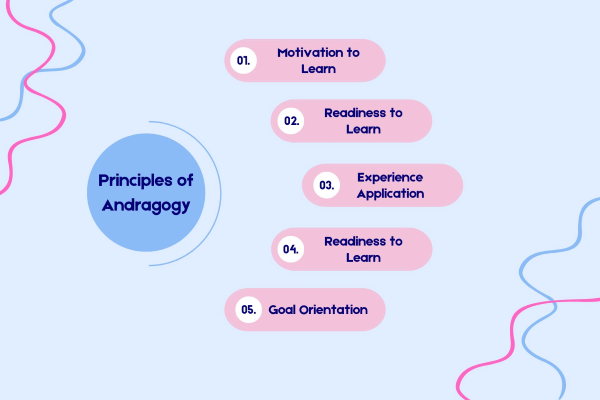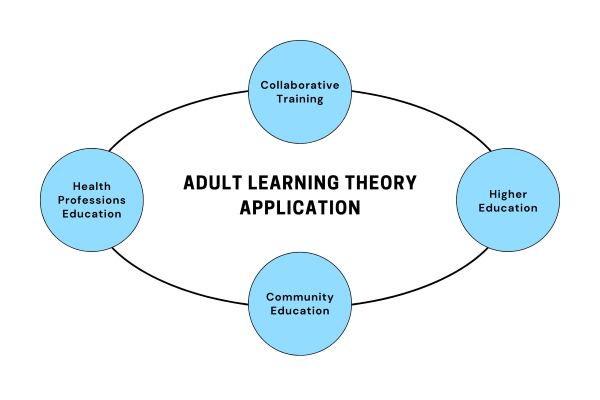We learn during our whole life, and it is a neverending circle. People choose what to learn all the time, based on their jobs, hobbies, or just skills they want to master. The adults’ learning manner differs from the one of children. Adults, compared to children, are more goal-oriented, as they know why they learn and what is their final goal. In this blog post, you will find out detailed explanation of adult learning theories, their principles, and examples. Moreover, you will learn about the application of adult learning theories in different fields.
What is Adult Learning Theory?
Adult learning theory, also known as andragogy, studies how adults learn, master new skills, and expand their knowledge. The learning process of adults differs from the learning process of children. Unlike children, adults know why they are learning the exact material, and that’s why their motivation is higher. Andragogy focuses on the best methods for adult learners, and understanding the adult learning theory is especially beneficial for the course creators.

Adult learning theory was introduced in 1968 by Malcolm Knowles, the theory is also called andragogy. The primary purpose of the adult learning theory is to explore the learning methods of adults and show how they differ from the learning methods of children. One such difference is the necessity of having someone in charge of the classroom in the case of children, while adults can organize everything by themselves.
The Main Principles of Adult Learning Theory
So far, you have formed a primary understanding of the concept of adult learning theory or andragogy. To delve deeper into the meaning of this learning theory and to find out more about it, let’s mention the principles of andragogy.
Motivation to learn
Adults, in contrast to children, have a higher level of motivation when it comes to learning something new. They don’t need an external source of motivation to learn, adults take up learning because they know the reason and purpose of their studying, but children on the other hand, learn because they are expected to do so.
The internal motivation of adult learners leads them to find out what they want to learn, you can organize courses based on the preferences and interests of adult learners. Let them know their achievements throughout the course so they will stay motivated to continue. Online learning platforms are very convenient for such courses.
Readiness to learn
Adult learners are ready to absorb new information and learn something new. This mainly comes from everyday life needs. People learn something that they need at the moment based on the circumstances. It can be connected with job requirements, life changes, or just hobbies.
Thus, planning certain online courses that will fulfill the need to study for adult learners, will be a good way of engaging them in the learning process. Adult learners are ready and willing to take courses that will help them learn something they want and need.
Experience application
Adult learners usually apply their experience to the new learning process. This facilitates their learning a lot. In contrast to children, adults have more experience and when learning something new, they use their experiences to understand the information faster and better.
The courses that appreciate the use of experience are highly preferred by adult learners, as the real-life and relatable examples make it easier for them to learn.

Goal orientation
Adults are goal-oriented, they learn and focus on achieving their final goals. As we have already mentioned, adult learners know the purpose of their learning, and they concentrate on the final result.
Thus, online courses should keep in mind that adult learners are goal-oriented, but meanwhile, the latter should be realistic about their goals and the time frame of achieving them.
Self-orientation
Adult learners are self-directed compared to children. Adults want to choose when and how they are going to learn, rather than going with the flow. The courses that are flexible for learning in terms of time and availability are highly preferable for adult learners. The course creators should consider this, and organize courses that allow users to choose when and how they will take the course.
Comparison of Adult Learning Theorie
We have discussed the adult learning theory, which is also called andragogy. This theory focuses on studying how adults learn and expand their knowledge, and how they master new skills. Above, we discussed the five principles of andragogy. There is no single theory about adult learning. In fact, other adult learning theories besides andragogy explore the stages of adult development. Hence, let’s mention other types of adult learning theories and compare them.
Transformational Learning
Transformational learning claims that the way people learn new things differs based on their experiences and beliefs. They see the world from different perspectives. Transformational learning aims to change the old perception of the world of adult learners and help them adapt to a new one. For instance, the participants engage in a discussion in diversity training to challenge their perceptions and biases and try to change their cultural understanding.
Experiential Learning
This learning theory concentrates on the experience. It puts the learner in the center and requires them to take part in the learning process actively. Adult learners use their newly learned skills and reflect on them. Experiential learning requires constant active learning and thinking.
Social Learning Theory
Social learning theory is based on the concept of learning from observation. This theory requires others to be role models for the new employees and learners to observe and resemble them. For instance, in a training workshop for teachers, they might watch videos for strategies and then discuss and practice them in a group. The theory supports collaborative learning.
Action Learning
The action learning requires adult learners to gather knowledge and put them into action in a group. Action learning aims at developing strong team-building and helps learners avoid skill gaps.
Constructivism
Constructivism supports problem-based learning. This theory suggests that people form their world understanding through learning and experience. Constructivism requires the coaches to teach and facilitate the information for the learners, the latter actively engages in the learning activity.
Cognitivism
The cognitivism concentrates on the memory and thinking of the learner, the theory supports problem-based learning. Cognitivism aims at making the learning process simple and available by facilitated, organized, and structured learning.
Behaviorism
Behaviorism suggests that the learning process affects the adult’s behavior. It forms a certain type of behavior in the learners. To achieve this different tools are used, for instance by successfully passing a course the learners get prizes and rewards, while for failing they don’t get anything.
The types of adult learning theories are different and they convey different meanings and principles. All of them focus on the impact of the learning process on adult learners, how they learn, in what kind of environment, how it changes their world perception and behavior, and how it develops teamwork, etc.
Application of Adult Learning Theory in Different Fields
Having established the primary understanding of adult learning theories, and their types and especially delved into the examination of andragogy and its principles, we are a step closer to finding out where and how the adult learning theories can be applied. Some fields of application may include:

Collaborative Training
Adult Learning theories can be effectively applied in collaborative training programs. Adults are self-directed and goal-oriented, they prefer to engage in problem-solving and applicable tasks. These training programs are usually interactive and promote active participation. The collaborative training programs allow adult learners to reflect and apply their new skills on the job.
Higher Education
Adult learning theories can be a good way of creating and delivering courses in higher education institutions. Flexible courses align with the adult learner’s requirements and needs, in this way encouraging them to engage in interactive learning and discussion of the material.
Community Education
In community education programs adult learning theories are utilized as well. Adult learners may seek courses for knowledge and skills enhancement and personal enrichment. Community education programs allow adult learners to gain skills to enhance their lives overall.
Health Professions Education
The application of these learning theories in healthcare is essential in terms of having such professionals who are capable of complex decision-making and critical thinking. The use of adult learning theories suggests utilizing problem-based thinking and reflection.
Conclusion
In conclusion, we have established the main idea of adult learning theory, known as andragogy as well, which aims at exploring the way adults tend to learn and highlighting the differences between adult learning and children’s learning. Andragogy suggests some principles that we have discussed above. In fact, there are other adult learning theories as well, such as transformational learning, behaviorism, cognitivism, and many more. The purpose of these theories differs, and they support different principles of learning. Adult learning theories are applicable in various fields of study and are effectively utilized. Hence, adult learning theories are essential for understanding the delicate nuances of learners and having courses that are structured and organized to be a success.